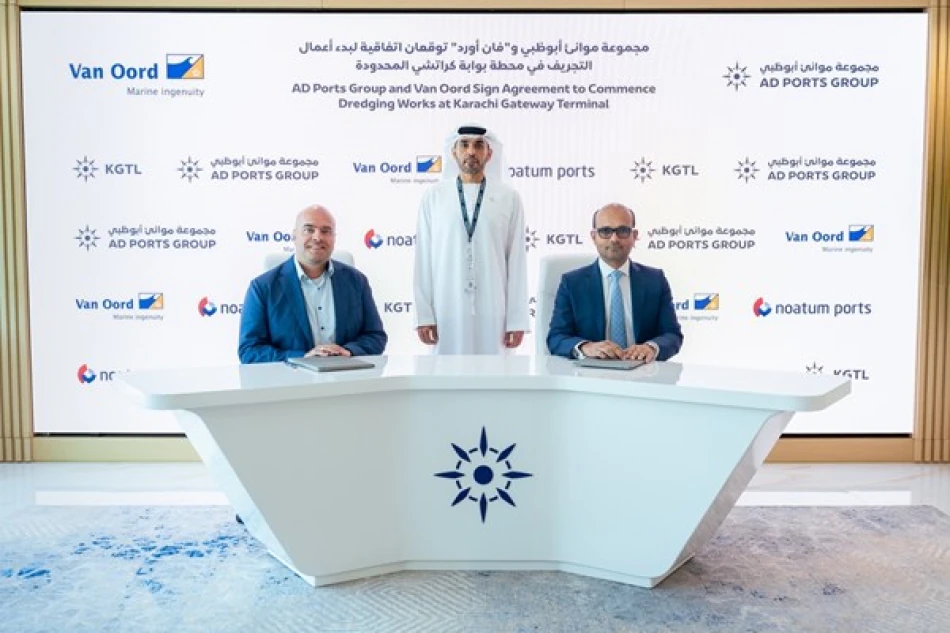
Abu Dhabi Ports Inks Dredging Deal to Boost Operational Capacity at Karachi Terminals
Abu Dhabi Ports Deepens Pakistan Push with $300 Million Karachi Expansion
Abu Dhabi Ports Group has signed a major dredging contract with Dutch maritime specialist Van Oord to dramatically expand capacity at its Karachi Gateway Terminal, marking the latest phase of the UAE's $300 million infrastructure bet on Pakistan's strategic trade position. The project will double container handling capacity to one million TEU annually by 2026, positioning Karachi as a critical hub for China-Pakistan Economic Corridor trade flows.
Massive Infrastructure Upgrade Targets Mega-Ships
The dredging partnership between Abu Dhabi's Noatum Ports and Van Oord will deepen berths and maritime channels to accommodate container vessels measuring 305-350 meters in length with drafts of 13-15.5 meters. This represents a significant leap from current capabilities, allowing the terminal to handle the latest generation of ultra-large container vessels that dominate Asia-Europe trade routes.
For the multipurpose terminal, the expansion will enable ships carrying up to 120,000 tons of general and bulk cargo—double the current 60,000-ton capacity. This scaling mirrors similar port modernization efforts across the Gulf, where operators are racing to capture growing trade volumes between Asia and global markets.
Strategic Timing Amid Regional Competition
Abu Dhabi Ports entered Pakistan in 2023 through long-term concession agreements, investing approximately 1.1 billion dirhams ($300 million) in port infrastructure and digital solutions. The timing reflects broader Gulf state strategies to diversify trade partnerships beyond traditional Western markets, particularly as China's Belt and Road Initiative reshapes regional logistics networks.
Pakistan represents a particularly attractive target given its position as the terminus of the China-Pakistan Economic Corridor (CPEC), a $62 billion infrastructure program linking western China to the Arabian Sea. Karachi handles roughly 60% of Pakistan's seaborne trade, making it a natural chokepoint for regional commerce.
Market Implications and Competitive Dynamics
The expansion directly challenges established players in the region, particularly DP World's operations in Pakistan and India's Jawaharlal Nehru Port Trust. By 2026, the upgraded Karachi terminals will compete with major regional hubs like Dubai's Jebel Ali and Singapore for transshipment cargo moving between Asia, the Middle East, and Africa.
For shipping companies, the deeper berths promise significant cost savings by eliminating the need for smaller feeder vessels and reducing port call times. This efficiency gain could redirect cargo flows through Karachi rather than more expensive alternatives in the Gulf or India.
Economic Catalyst for Pakistan's Trade Ambitions
The project addresses a critical bottleneck in Pakistan's trade infrastructure at a time when the country desperately needs foreign exchange earnings. Enhanced port capacity should reduce logistics costs for Pakistani exporters while improving the country's attractiveness as a manufacturing base for multinational companies seeking alternatives to China.
CEO Khurram Aziz Khan emphasized the project's potential to maximize foreign currency utilization for shipping services while reducing overall logistics costs—crucial factors for Pakistan's balance of payments challenges. The expansion also supports Pakistan's broader goal of becoming a regional trade hub, leveraging its geographic position between Central Asia, China, and Middle Eastern markets.
With completion scheduled for Q1 2026, the Karachi expansion represents one of the largest private port investments in South Asia, signaling sustained confidence in Pakistan's economic prospects despite ongoing political and financial challenges.
Most Viewed News

 Layla Al Mansoori
Layla Al Mansoori






